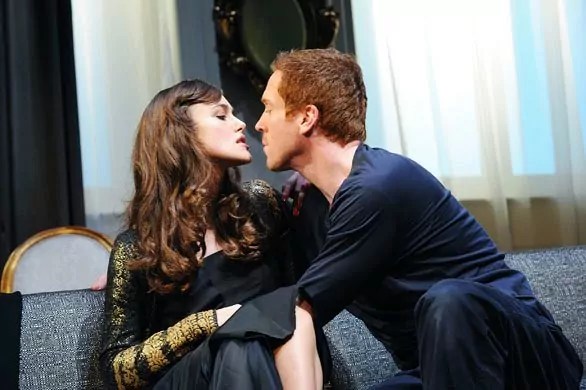 Continuing the countdown to Damian’s return to stage next week (!) with The Goat, or Who is Sylvia?, let’s take a visit to his penultimate play, The Misanthrope. It was 2009 when Damian played the lead role of Alceste in Martin Crimp’s modernized version of Moliere’s 17th century comedy. After his appearance in The Misanthrope he was not seen on stage again until American Buffalo six years later. Dare we say, The Misanthrope marked a turning point for Damian, the last one where he was the nearly A-list actor playing against decidedly A-list’er Keira Knightley. NOW, of course, he is not nearly anything but a full-blown highly sought commodity on stage and screen. In this post, I’ll tell you a bit about the play, then, beg your indulgence as I wax philosophical about the extent to which the themes of the play translate to Damian’s own career trajectory.
Continuing the countdown to Damian’s return to stage next week (!) with The Goat, or Who is Sylvia?, let’s take a visit to his penultimate play, The Misanthrope. It was 2009 when Damian played the lead role of Alceste in Martin Crimp’s modernized version of Moliere’s 17th century comedy. After his appearance in The Misanthrope he was not seen on stage again until American Buffalo six years later. Dare we say, The Misanthrope marked a turning point for Damian, the last one where he was the nearly A-list actor playing against decidedly A-list’er Keira Knightley. NOW, of course, he is not nearly anything but a full-blown highly sought commodity on stage and screen. In this post, I’ll tell you a bit about the play, then, beg your indulgence as I wax philosophical about the extent to which the themes of the play translate to Damian’s own career trajectory.
The story of The Misanthrope, in short: Alceste is a playwright. He’s a hater of all that is not genuine, not honest, not forthright. And he hates it all vocally with no regard for the feelings of whomever is on the other end of his diatribes. He justifies his hate with love. Love for perfection, love for truth. He wants people to be better than they are. This feeling of generalized idealism translates comically into unrealistically high expectations of the actual faulty humans around him. He’s finely attuned to the hypocrisy in others, to the conforming displays of sentiments from people he knows, in truth deep down, to be either too shallow or intrinsically cruel. The twist is that, in all of his self-righteous bluster, Alceste manages to fall in love with a woman who embodies everything he rails against.

The fact that The Misanthrope is dramatized some 400 years after it was written speaks to the universality of its themes. Moliere wrote the comedy to be performed in the court of Louis XIV. There’s a lot of name-dropping of figures of the time, which, in re-dramatizations of the play, leave lots of space for changing those names depending on the times. Martin Crimp did just that in his version written and set in 2009. Where Moliere wrote derisively of whatever figures were occupying the public sphere in 1666, Crimp, in 2009 wrote in David Cameron and Tina Brown. One can only imagine what names would substitute in a 2017 re-working of the same play. The point in dropping these names was to say to the audience: these are just names of people we all know and talk about all the time, but what are they really even saying? Are they saying anything at all of importance or are we just buzzing around them like idiots rapt in attention at nothing? If so, why?
 When the University of Massachusetts put on a production of the play, the creative team had some interesting things to say about Moliere’s themes. Their production took the 17th century play and transposed it into a modern-day sit com. How fun, right? A play about a sit com. In their version, Alceste is a hipster whining about “truth” and “justice” and going on and on about the “right” ways to appreciate art and culture. He works so hard to be non-mainstream and derides so vocally anyone who is towing the status quo that, against everything he holds so holy, he ends up towing that same status quo. It’s the old trap of a stubborn perfectionist refusing to conform eventually leading him to the one thing he despises: conforming.
When the University of Massachusetts put on a production of the play, the creative team had some interesting things to say about Moliere’s themes. Their production took the 17th century play and transposed it into a modern-day sit com. How fun, right? A play about a sit com. In their version, Alceste is a hipster whining about “truth” and “justice” and going on and on about the “right” ways to appreciate art and culture. He works so hard to be non-mainstream and derides so vocally anyone who is towing the status quo that, against everything he holds so holy, he ends up towing that same status quo. It’s the old trap of a stubborn perfectionist refusing to conform eventually leading him to the one thing he despises: conforming.
Quoted here, the Sunday Telegraph summarizes the plot precisely:
The romance that ensues between a man seeking greater meaning in life and a woman who epitomises meaninglessness is a comical affair.
Similarly, The Guardian sums up:
It rests on the premise that Alceste is a vehemently candid playwright who rails at the triviality of contemporary culture but is erotically ensnared by the movie star, Jennifer, who is one of its proudest embodiments.
A word to the wise: Martin Crimp’s script is written in rhyming couplets. Now, I tend to like poetry that doesn’t rhyme. Rhyming is meant for pop songs, right? I’d venture to say that the perfect vessel for rhyming, at its most culturally developed state, is hip-hop music, the only place where the act of rhyming actually reaches those “wow” moments that you like language to reach. Otherwise, rhyming is a trick not meant for spoken word, and certainly not for literature. My point being, reading a rhymed text on the page is problematic. You want to just prance around and sing it instead of reading it. That said, I’m sure Damian did a fine job of translating the particular oddity of the language into believable and relatable action on the stage. Witness this tiny bit I found within a longer interview that Keira Knightley gave to the BBC :
Suffice it to say, I think if I had seen this play on stage with Damian, I would have enjoyed it much more than I did in reading it. Critics, by and large, agree that Damian was tasked with the heaviest lifting in this production and he held up his end beautifully. A quote from the London Metro:
Damian Lewis relishes his role as self-appointed ranting outcast, delivering Crimp’s clever, fluid verse with elan and delightedly toying with the post-modernism of the whole occasion.
More on Damian’s skills from The Guardian:
…it is cast from strength. Damian Lewis has the right mix of righteous anger and comic absurdity as Alceste. There’s a tell-tale moment when, having inveighed against the human race, he is asked about his paradoxical passion for Jennifer. “She’s young and vulnerable,” says Lewis in the gooey, forgiving tones of the besotted intellectual. And, although he finally sees through Jennifer’s fickleness, he never lets us forget that sex is often the idealist’s achilles heel.
One could argue that Damian had it relatively easier in this play, what with all eyes on Keira. At that time, she was already the second highest paid actress in Hollywood, a sweetheart winner by all counts, and, therefore, susceptible to the most cruel scrutiny of critics. Folks were looking for her to fail. Some of them, like the Sunday Telegraph, did find some things to quip about:
Her beautiful features, which lend themselves so perfectly to close-up shots on screen, seem suddenly diluted and diminished on stage.


 By and large, Keira held her own. And no one spoke more honestly about the situation than Damian himself. Imagine, sitting as we do in 2017 where Damian Lewis, if not summarily a Hollywood “heart throb”, certainly an actor most of the world now knows to be seriously talented, committed, present, willing to give every project he’s awarded his full attention and effort, all while having the miraculous ability to remain down to earth and not take any bit of his fame for granted, imagine THIS Damian Lewis being asked more questions about his cast mate than about himself? What a heady time it must have been for him, wanting to stay close to his young family while still wanting more vehicles to show his talent, do his thing. He played it all like a gentleman, of course.
By and large, Keira held her own. And no one spoke more honestly about the situation than Damian himself. Imagine, sitting as we do in 2017 where Damian Lewis, if not summarily a Hollywood “heart throb”, certainly an actor most of the world now knows to be seriously talented, committed, present, willing to give every project he’s awarded his full attention and effort, all while having the miraculous ability to remain down to earth and not take any bit of his fame for granted, imagine THIS Damian Lewis being asked more questions about his cast mate than about himself? What a heady time it must have been for him, wanting to stay close to his young family while still wanting more vehicles to show his talent, do his thing. He played it all like a gentleman, of course.
In reference to the added pressure Keira was under, Damian said:
I hope people are as objective as they can be, because it’s very distorting having someone with that much baggage come to do a play.
Fame leading to a distortion of reality. Who knew? But, of course, it’s true. It’s the genie come out of the lamp, isn’t it, sometimes? You know it’s temporary, so you have to keep your head about you, but you still rather relish all that attention. How can you not when it’s all you ever worked for and more? Then, he concedes that her name got the crowds to the theater and often those people were people who’d never been to theater.
We certainly wouldn’t have filled it up in such a dramatically quick way. Keira is bringing people to the theater that never go to the theater.
Simultaneously, he acknowledges HIS audience, the folks who do know a thing or two outside Hollywood:
At the same time, most of them will know who Tara [co-star Tara FitzGerald, who was Ophelia to Lewis’ Laertes] is and who I am and that will be an added bonus. We hope. [Laughs.]
Again, asked for his feelings about his much better know co-star, Damian says:
“She has taken on this role with a great deal of humour about her current position in the industry,” he continues. “She’s a young film icon, for heaven’s sake. She’s the face of Chanel. And she’s playing a character who’s going to fascinate and intrigue and appal [sic] us. She must have experienced a lot of that world in her own life, to some degree, so she understands the part and completely gets it.”
And as a beautiful summary to Alceste’s motives, Damian offers:
“You think it’s a play that operates only on the surface, but the more you work on the text, the more complex and ambiguous it turns out to be. As much as it attacks insincerity, flattery and hypocrisy, it’s also a play about love.”
 In a clever piece for The Guardian, Martin Crimp wrote an imagined interview with Moliere about his play. Crimp would ask Moliere, what is Alceste so angry about, why would he walk out of his own play? The answer:
In a clever piece for The Guardian, Martin Crimp wrote an imagined interview with Moliere about his play. Crimp would ask Moliere, what is Alceste so angry about, why would he walk out of his own play? The answer:
“Look, what I’m saying is that, deep down, there has to be something disturbing about Alceste. He’s more than just a critic: any half-baked blogger or columnist can let off steam like a screaming kettle. No – Alceste is more extreme than that. He’s a man whose uncompromising view of human beings means he is incapable of living with them. That’s what being a misanthrope really means. And that, Martin, is why you have to walk out at the end.”
Martin Crimp’s version of the play was produced in NY as well, without Damian, but with Uma Thurman in the role of Jennifer. I believe this quote will give you feel for the general texture of the play.
The point appears to be that compared with their latter-day counterparts, the courtiers and dilettantes of the age of Louis XIV were pikers in the practice of surface worship and self-interest. But after you get past the initial jolt of the script’s novelty — the barbed allusions to current cultural figures ranging from David Hare to Tina Brown, the use of jargon both academic and obscene — an unrelieved sourness sets in. You experience that sinking feeling that arrives when you’re seated at a dinner party at a table of people you know you’re not going to like and who aren’t quite monstrous enough to be skewered in amusingly horrified anecdotes afterward.
Not liking anyone around you, but not having enough ammunition to hate them either, that’s the condition Alceste lives in. I can only imagine what raw and honest treatment Damian brought to such a confounding ambivalence. Being asked to compare himself to Alceste, Damian is asked: Idealist or pragmatist, what has he been in his own career? His answer in perfect diplomacy:
“I don’t set myself up to be one thing or the other,” he says, “because I will only end up contradicting myself.”


FANTASTIC – how FUN that you have found this little clip from The Misanthrope! Even a glimpse into the play gives you an idea about Damian’s performance. LOVE IT – thank you!
Damian did The Misanthrope between Life and Homeland. You may not believe this but I am sort of glad I was not a fan of Damian’s back then – I did not even know he existed – and you know why 🙂 I have never been able to bring myself to like Keira Knightley as an actress. I just don’t think she is a good actress. I would probably still go see Damian in the play but I don’t know what I would do with Keira 😀
It’s quite interesting that several plays Damian was in have language games in different ways: constant wordplay in Five Gold Rings, rhyming in The Misanthrope and American Buffalo has this “iambic pentameter” which I had not heard of until I wrote about that play in 2015.
Thank you!!
Wow, I’m surprised you didn’t know iambic pentameter before last year? Meaning you never read Shakespeare in school? Most of Shakespeare’s plays are written in iambic pentameter.
Language games are great when they don’t get too gamey. It’s easy to fall into the trap of sing-song’ing clever rhymes when reciting them. But the trick is to keep the rhythm sort of behind the language. Leave language the way it’s supposed to spoken naturally and let the rhythm come out on its own. In Shakespeare it does. Not all playwrights can be Shakespeare. 🙂 And, yes, even in this little clip, one can tell how Damian is able to control the language by modulating his voice in ways that even his screen partners cannot manage. 🙂
Why are you surprised? 🙂 I didn’t go to school in Europe or the US. You guys probably did not read Persian or Ottoman Poetry in school, either. Or maybe you did. We read a couple of things from Shakespeare but learnt nothing about the Iambic Pentameter. And we read whatever we did from Shakespeare in Turkish in our literature classes. So it was translation and one cannot really get the iambic pentameter or anything like that in translation.
You are absolutely right that all playwrights cannot be Shakespeare. But some make the mistake of believing that they are and they screw up 🙂
Absolutely true of course. I didn’t know Rumi or even Khalil Gibran until university, and even then not many classes taught Eastern literatures back then. (I did take an interesting class called the Tao of Islam, taught by a japanese muslim woman 🙂 I’m sure that has changed for the better these days. 🙂
Thankful for this. Was looking forward to blog posts about both, Misanthrope and American Buffalo (next week), because I know nothing of Damian in these two plays.
Iambic Pentameter. Ahh. Reading Shakespeare in high school and then my Creative Writing professor in college beating me over the head with it.
Thanks again!